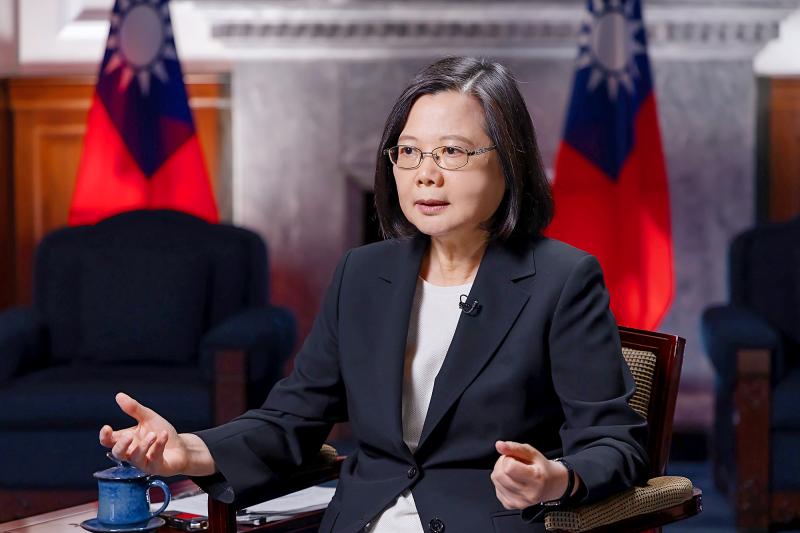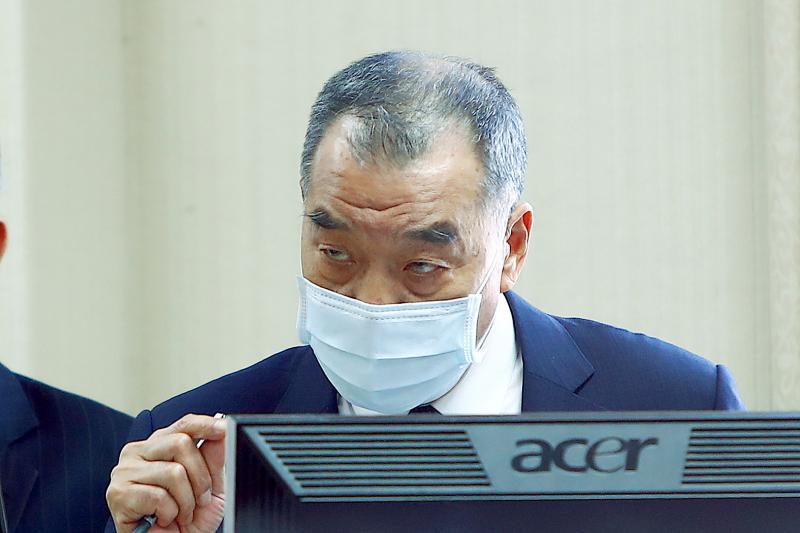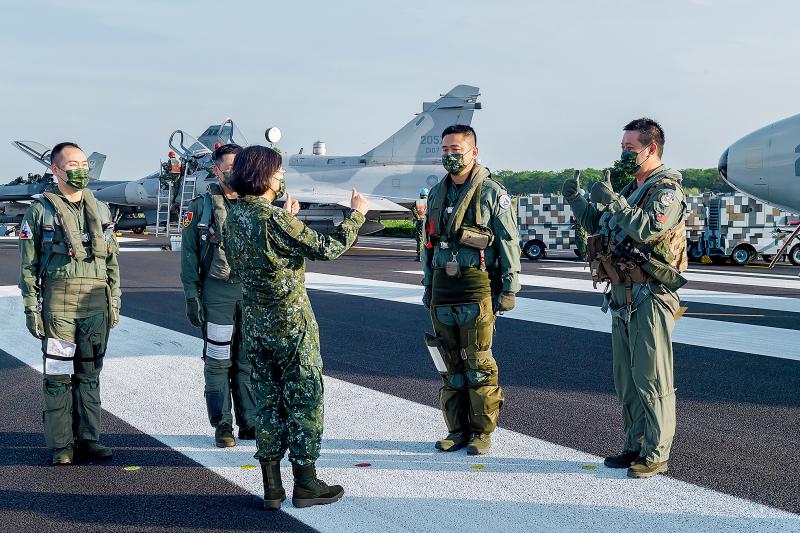A small number of US armed forces personnel are in Taiwan to train with Taiwanese soldiers, President Tsai Ing-wen (蔡英文) said in an interview with CNN, confirming the presence of US troops in the nation.
“We have a wide range of cooperation with the US aiming at increasing our defense capability,” Tsai told CNN in the interview aired yesterday.
Asked how many US service members are deployed in Taiwan, she said only that it was “not as many as people thought.”

Photo: Presidential Office, CNA
The confirmation comes as China is sharply increasing military pressure on Taiwan, including repeated missions by Chinese warplanes in Taiwan’s air defense identification zone.
Speaking with CNN, President Tsai Ing-wen said Taiwan, which is located fewer than 200 kilometers (124 miles) away from China’s southeastern coast, was a “beacon” of democracy that needed to be defended to uphold faith worldwide in democratic values.
“Here is this island of 23 million people trying hard every day to protect ourselves and protect our democracy and making sure that our people have the kind of freedom they deserve,” she said.

Photo: Daniel Ceng Shou Yi, EPA-EFE
“If we fail, then that means people that believe in these values would doubt whether these are values that they (should) be fighting for.”
Tsai also expressed faith that Washington would help defend against a Chinese attack, days after US President Joe Biden pledged to do so during a CNN town hall event.
The White House, following Biden’s remark, later issued a clarification stating that US policy toward Taiwan remained unchanged.

Photo: Presidential Office, AP
The threat from China was “increasing every day,” Tsai told CNN, adding that her administration had been trying to make the country stronger in all aspects to defend it against increasing Chinese military power.
Efforts to bolster the nation’s defenses have included developing asymmetric warfare capabilities, expediting military reforms and garnering support from the international community, Tsai said.
At the same time, Tsai reiterated her interest in speaking with Chinese President Xi Jinping (習近平), adding that more conversation would be helpful to reduce misunderstandings between the two sides.
“We can sit down and talk about our differences and try to make arrangement[s] so that we will be able to coexist peacefully,” Tsai said.
Separately yesterday, Minister of National Defense Chiu Kuo-cheng (邱國正) said that Taiwan-US military interactions were “quite a lot and quite frequent,” and had been going on for a long time.
However, Tsai did not say that US forces are permanently based in Taiwan, Chiu said.
“There is no connection between personnel exchanges and the stationing of troops,” Chiu told a legislative meeting in Taipei.
Taiwan must be prepared to defend itself and could not entirely depend on other countries to help if China were to launch an attack, he told reporters later after being questioned at the legislature during a session on national defense.
“The country must rely on itself, and if any friends or other groups can help us, then it’s like I said before, we’re happy to have it, but we cannot completely depend on it,” he said.
Meanwhile, Beijing said that it opposes military ties between Taipei and Washington.
“We firmly oppose any form of official exchanges and military contacts between the United States and Taiwan, oppose US interference in China’s internal affairs, and attempts to provoke and stir up trouble,” Chinese Ministry of Foreign Affairs spokesman Wang Wenbin (汪文斌) said.
Chieh Chung (揭仲), an assistant professor at Tamkang University in New Taipei City, said it was unlikely that Beijing was not aware of the presence of US military personnel in Taiwan.
Tsai’s statement was probably intended as a message to Beijing that military exchanges between Taiwan and the US had gone well, Chieh said.

The Central Election Commission has amended election and recall regulations to require elected office candidates to provide proof that they have no Chinese citizenship, a Cabinet report said. The commission on Oct. 29 last year revised the Measures for the Permission of Family-based Residence, Long-term Residence and Settlement of People from the Mainland Area in the Taiwan Area (大陸地區人民在台灣地區依親居留長期居留或定居許可辦法), the Executive Yuan said in a report it submitted to the legislature for review. The revision requires Chinese citizens applying for permanent residency to submit notarial documents showing that they have lost their Chinese household record and have renounced — or have never

A magnitude 5.6 earthquake struck off the coast of Yilan County at 12:37pm today, with clear shaking felt across much of northern Taiwan. There were no immediate reports of damage. The epicenter of the quake was 16.9km east-southeast of Yilan County Hall offshore at a depth of 66.8km, Central Weather Administration (CWA) data showed. The maximum intensity registered at a 4 in Yilan County’s Nanao Township (南澳) on Taiwan’s seven-tier scale. Other parts of Yilan, as well as certain areas of Hualien County, Taipei, New Taipei City, Taoyuan, Hsinchu County, Taichung and Miaoli County, recorded intensities of 3. Residents of Yilan County and Taipei received

Taiwan has secured another breakthrough in fruit exports, with jujubes, dragon fruit and lychees approved for shipment to the EU, the Ministry of Agriculture said yesterday. The Animal and Plant Health Inspection Agency on Thursday received formal notification of the approval from the EU, the ministry said, adding that the decision was expected to expand Taiwanese fruit producers’ access to high-end European markets. Taiwan exported 126 tonnes of lychees last year, valued at US$1.48 million, with Japan accounting for 102 tonnes. Other export destinations included New Zealand, Hong Kong, the US and Australia, ministry data showed. Jujube exports totaled 103 tonnes, valued at

BIG SPENDERS: Foreign investors bought the most Taiwan equities since 2005, signaling confidence that an AI boom would continue to benefit chipmakers Taiwan Semiconductor Manufacturing Co’s (TSMC, 台積電) market capitalization swelled to US$2 trillion for the first time following a 4.25 percent rally in its American depositary receipts (ADR) overnight, putting the world’s biggest contract chipmaker sixth on the list of the world’s biggest companies by market capitalization, just behind Amazon.com Inc. The site CompaniesMarketcap.com ranked TSMC ahead of Saudi Aramco and Meta Platforms Inc. The Taiwanese company’s ADRs on Tuesday surged to US$385.75 on the New York Stock Exchange, as strong demand for artificial intelligence (AI) applications led to chip supply constraints and boost revenue growth to record-breaking levels. Each TSMC ADR represents